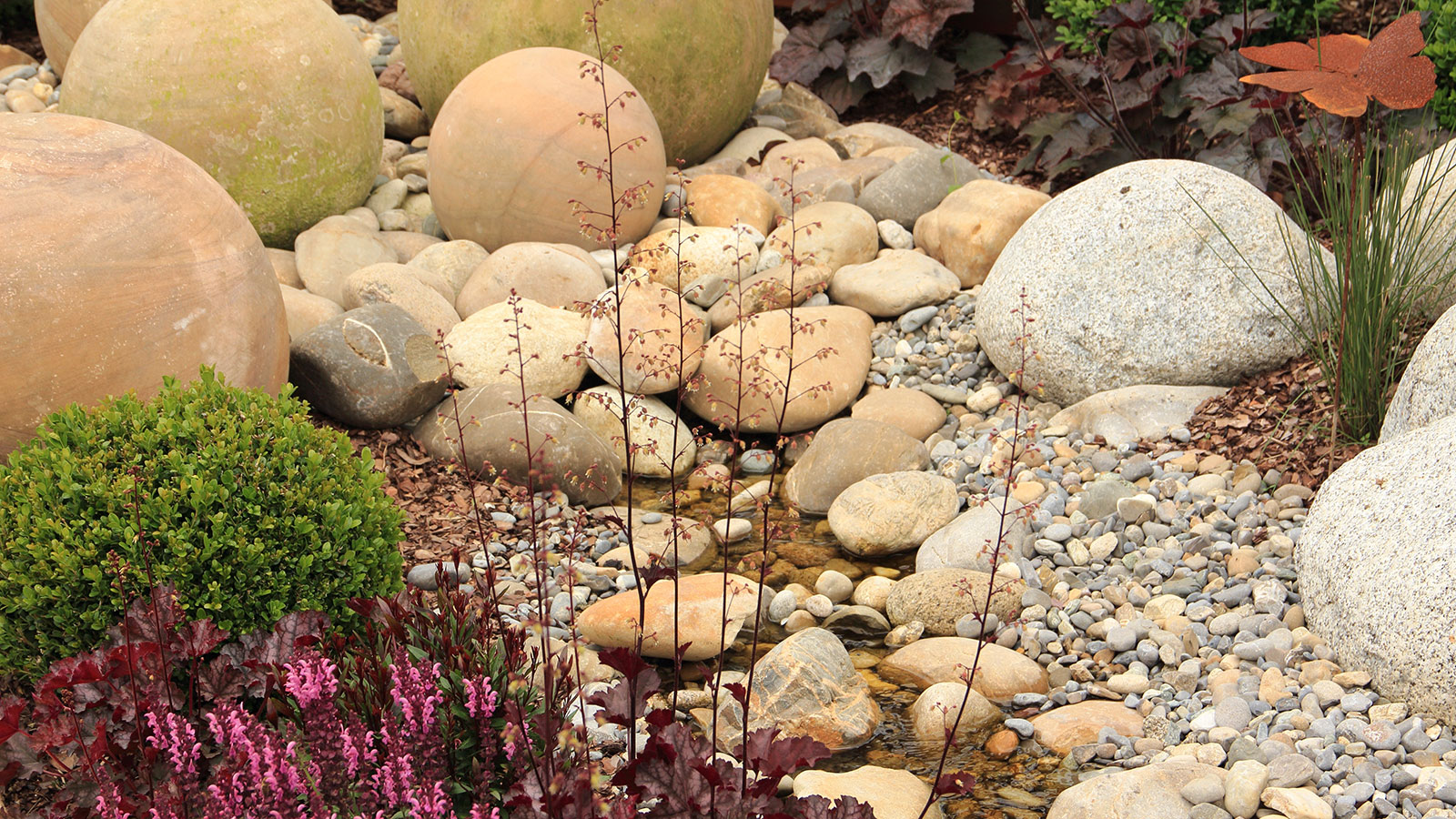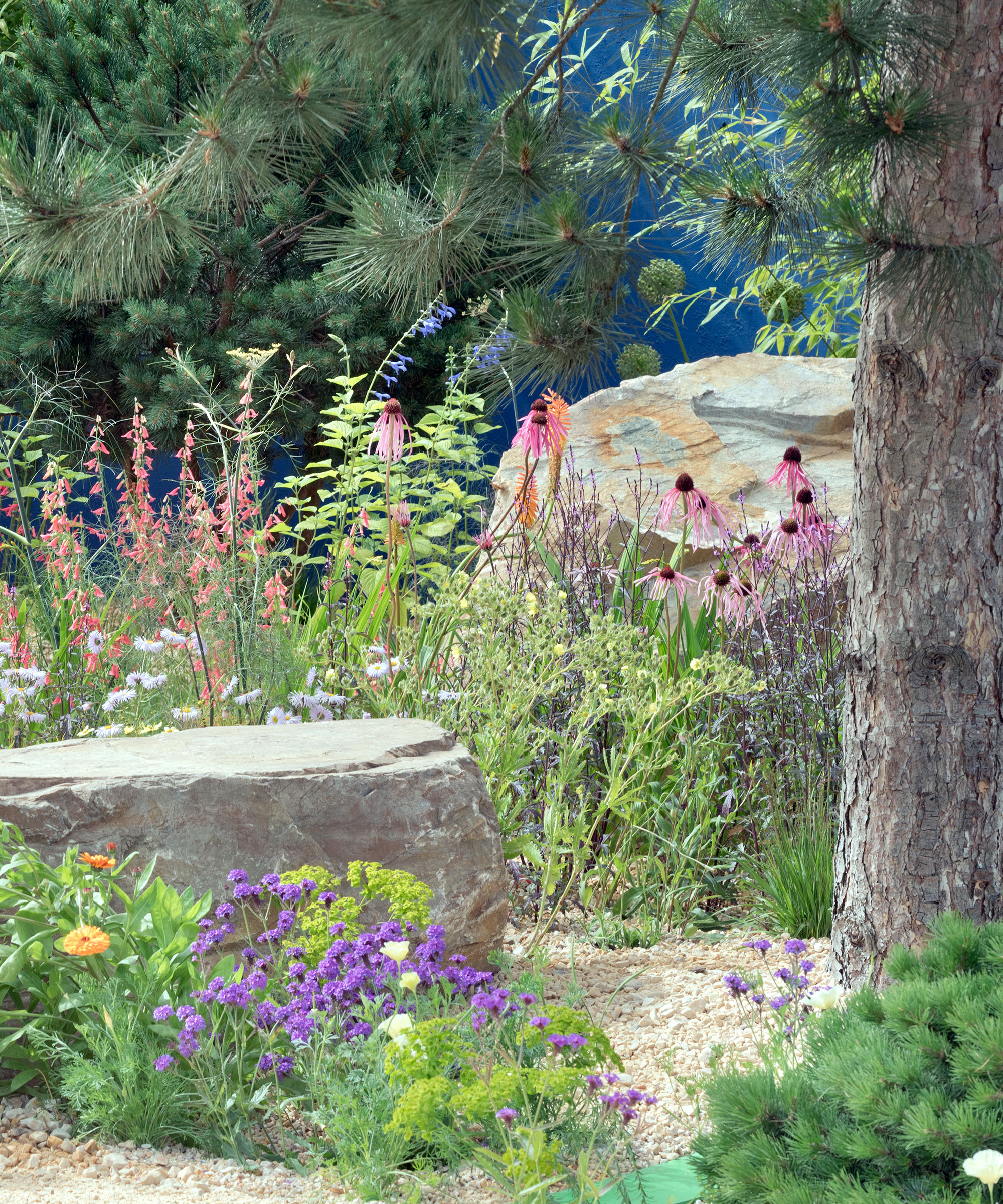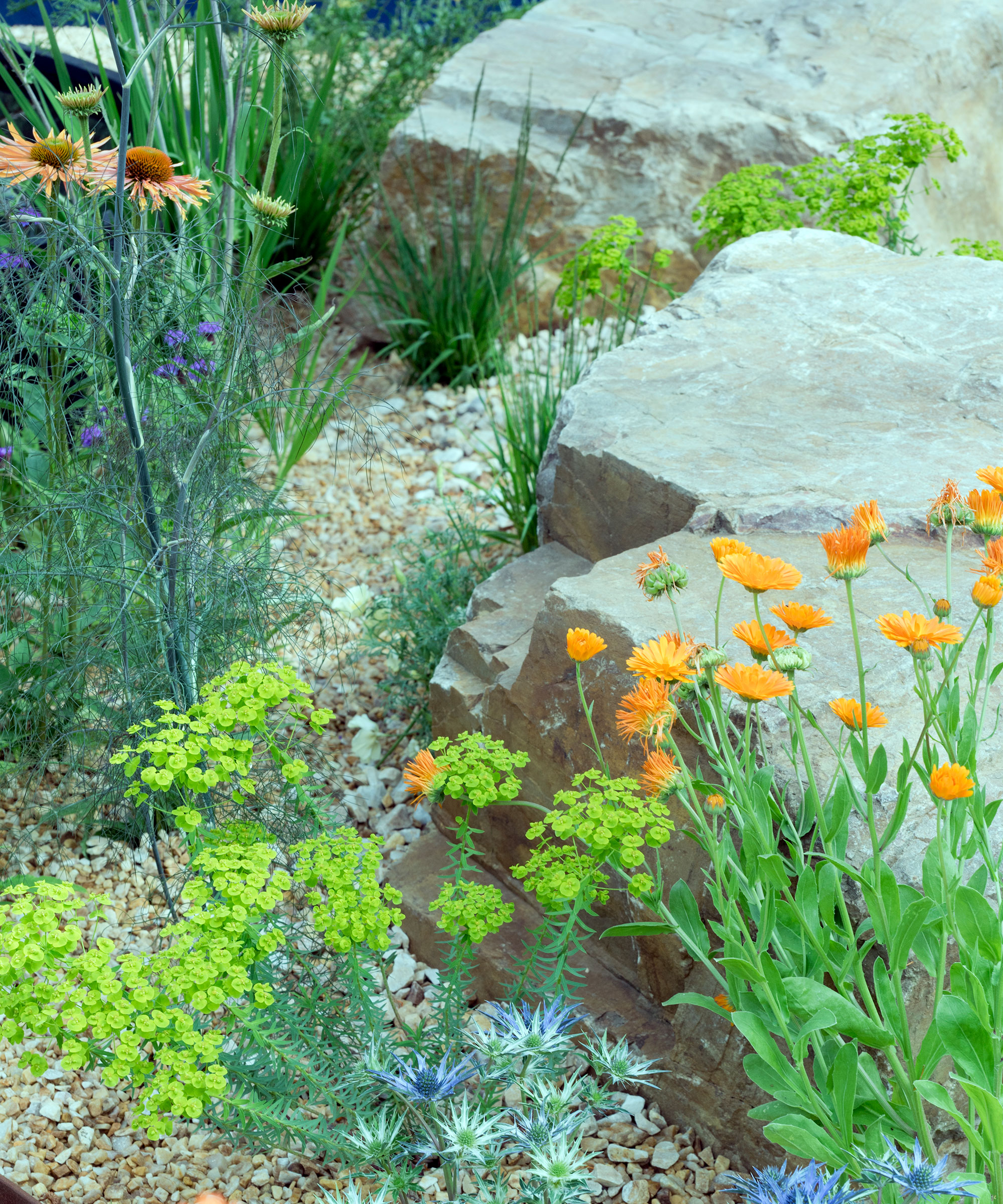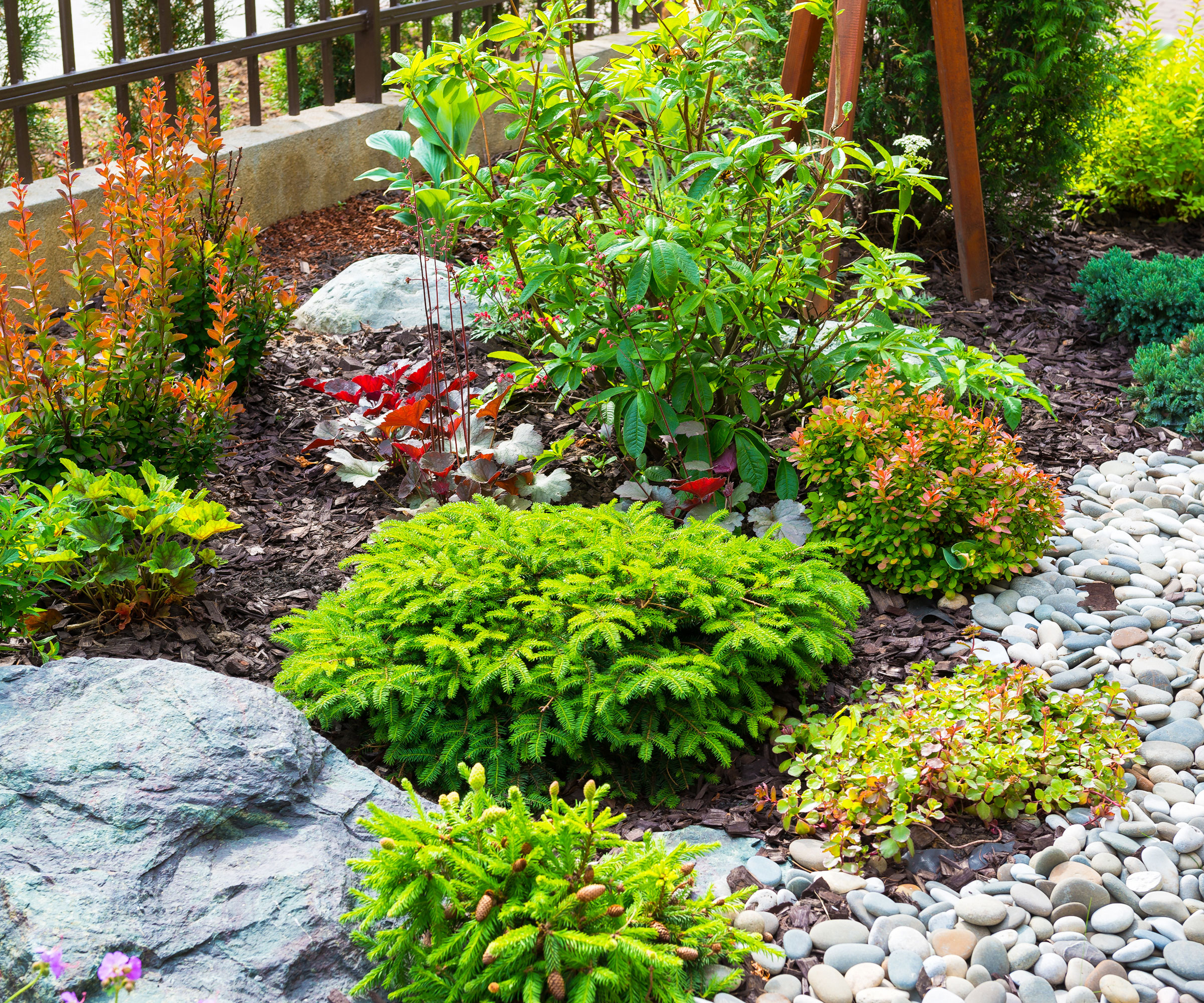
There are a number of outdoor chore that gardeners may not necessarily look forward to, but that have a big impact on the overall look of your garden. Cleaning landscaping rocks is one of them.
Whether your landscaping ideas with rocks include big boulders dotted around the backyard or small decorative stones around your flower beds, there is no doubt that they will gather dirt over time. To keep your backyard tidy, adding an occasional cleaning to your routine is advised.
Luckily, in most cases, the cleaning process is quite simple and doesn’t have to be a hassle. Regular checks, along with the right preparation and maintenance, will have your landscaping rocks looking as good as the day you bought them.
Tips for how to clean landscaping rocks big and small
The first question to ask when you’re considering large landscaping rocks is do they really need to be cleaned? Depending on materials and the overall design of your garden, keeping large rocks natural can look better and requires far less effort than continuously washing. However, if you have a modern backyard with lots of clean lines and sleek materials, dirty landscaping rocks can ruin the overall aesthetic. Plus colored rocks or slate look much tidier when cleaned regularly, especially in high-traffic areas.

How to clean large landscaping rocks
For large boulders, garden debris or visiting birds cause mess that often detracts from the overall look of your backyard landscaping and the purpose of the decorative stone. In these cases, a quick rinse will have a big impact.
Thankfully, cleaning landscaping rocks is not a difficult task. Follow these easy steps to get started:
- Remove loose debris Experts at Rock Stone & Pebble recommend brushing stones first with a broom or blowing away debris with a leaf blower before you start to remove any loose dirt.
- Wash with a hose Next, rinse off the rocks with a spray of water. If you clean regularly, this may be enough to keep them tidy. If not, move on to the next step.
- Scrub with soap and water Stubborn dirt can be wiped or scrubbed with a cloth and some soapy water. If a thick layer of dirt has built up on the stone, rinse it off with a pressure washer first to make the process easier.
- Remove mold or fungus If you encounter any mold or fungus, it’s best to remove using natural cleaning products to stop any issues from spreading around your garden and perhaps even turning your patio green. A mixture of vinegar and water is effective at removing most problems, but you can also use specialized outdoor cleaning products for tougher issues.

How to clean landscaping stones in beds or paths
Smaller landscaping rocks are a little more complicated to clean. The same approach of rinsing each stone with soap and water doesn’t apply when you have hundreds to deal with in a garden path or across your beds.
If your landscaping stones only need a light clean, rinsing them off with a hose will get rid of most of the visible dirt. Ensure the spray is not too powerful, especially for smaller rocks in a gravel garden, to avoid displacing them. Unless your landscaping stones are large and heavy, a pressure washer will likely have too much force for cleaning smaller stones.
After rinsing, you can target any problematic areas, cleaning individual spots or removing larger patches of debris.
Deep cleaning – often required for high-traffic areas of your garden like pathways or gravel patios – is a longer process requiring more attention. Decorative Aggregates recommends starting by sifting the gravel with a mesh sieve to remove any debris stuck between the stones. Then, wash the stones with a hose before returning them to their previous home, good as new.

How to keep landscaping rocks clean
Regularly cleaning landscaping rocks is a great way to keep your garden tidy year-round. This maintenance not only makes it easier when the time comes, but also limits how often you will need to clean your stones.
However, as with most things in gardening, preparation is key. For any large areas covered with stone, such as pathways, lay down a weed mat before the stones for a clean and weed-free surface. Proper garden edging around the area will also go a long way to keeping the rocks clean and weed-free. Get rid of weeds that do pop up regularly by hand to stop them from spreading around the area.
It's important to rinse off any garden debris with a hose to stop dirt from building up.
If you want to limit the amount of cleaning required, it’s best to choose landscaping rocks with dark colors and tough materials that won’t attract much dirt. We may like the look of stark white stones, but there is no doubt that they are much tougher to clean than regular stone.
Benefits of cleaning landscaping rocks
Large landscaping rocks are wonderful decorative additions to gardens, needing little maintenance and withstanding changing weather well. But as they gather dirt over time, they can lose their decorative value and become more of an eyesore.
A regular cleaning routine will keep not only the rocks – but your backyard as a whole – much tidier. This process can also remove moss or mold that can become a slipping hazard in high-traffic areas or spread around the rest of your garden. A tidy garden also limits problems with pests and diseases, helping your plants at the same time.
FAQs
How do you make white garden stones white again?
If your white landscaping stones are still not completely clean after hosing them down, there are a few natural solutions you can try. A mixture of white vinegar and water can help remove any stubborn dirt. Baking soda can also lift dirt, and is best used with warm water and an abrasive brush.
Avoid using harsh cleaning products like bleach around plants, and make sure you rinse your landscaping rocks thoroughly before placing them back in your yard.
Landscaping rocks can be a wonderful addition to both your back and front yard landscaping, and how regularly you clean them will typically depend on the overall look you are trying to create. To make the task of keeping them clean even easier, I like to quickly spray my landscaping rocks when watering my plants – a simple and low-maintenance way to keep them dirt-free.







